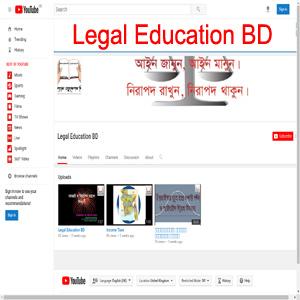Mirpur Law and Consultancy Firm

Mirpur Law and Consultancy Firm
Services
TIN & Income Tax ,
Value Added Tax (VAT) ,
Trade License ,
Procedure of IRC & ERC ,
New NGO Registration ,
Company Formation ,
Marriage/Divorce,
Notary/Affidavit
BSTI Certificate
BOI Certificate



Mo |
Di |
Mi |
Do |
Fr |
Sa |
So |
1 | ||||||
2 | 3 | 4 | 5 | 6 | 7 | 8 |
9 | 10 | 11 | 12 | 13 | 14 | 15 |
16 | 17 | 18 | 19 | 20 | 21 | 22 |
23 | 24 | 25 | 26 | 27 | 28 |
Muhammad Murad Uddin
(M.Com-Accounting, PGD-HRM, LLB, ITP)
Advocate and Tax Adviser
Phone: 01967113128, 01723946969
Email: muradserge@gmail.com, mlcfbd5@gmail.com



Just about anyone can start a family on their own, but certain procedures affecting the responsibilities of family life must be pursued in court. While matters of the heart are very personal, the rights of same-sex couples to get married, laws regarding divorce, and the process of adopting a child are governed by state and federal laws. "Family law," therefore, refers to rules, regulations, and court procedures involving the family unit. While some family law matters may be handled without counsel, processes such as divorce and child custody often require the skill and expertise of a skilled attorney.« Show Less
FindLaw's Family Law Center includes information about marriage, child custody, divorce, reproductive rights, adoption, paternity, domestic violence, and other relevant topics. This section provides legal tips, overviews, summaries of state laws, and other resources to help you make the right decisions for you and your family.
What Does Family Law Cover?
Civil procedures and legal matters involving family members' financial responsibilities, custodial rights, eligibility, and other obligations generally fall under the family law category. Domestic violence and child abuse are included in this section, although they are criminal matters. The following is a list of family law topics:
- Marriage & Living Together: Eligibility requirements such as age and gender (i.e., same-sex marriage) are primarily governed at the state level. Also, different states have different laws governing legal partnerships other than marriage.
- Divorce & Alimony: Also called "dissolution of marriage," divorces come about via court order, either with or without legal representation. Sometimes one spouse will be required to provide financial support for the other after a divorce.
- Child Custody & Child Support: When parents get divorced, the court must decide what is in the best interests of the children, which includes living arrangements and financial support.
- Adoption & Foster Care: A variety of legal considerations may come into play when adopting or fostering a child.
- Parental Liability & Emancipation: Parents often are liable for the actions of their children. Some children may become "emancipated" if they can prove their maturity and ability to live apart from their parents.
- Reproductive Rights: Laws governing abortion, birth control, artificial conception, and other reproductive rights are established at the state level and change often.
- Domestic Violence & Child Abuse: While these violations are handled in criminal court, they often raise legal issues affecting the family, as well.
Family law




